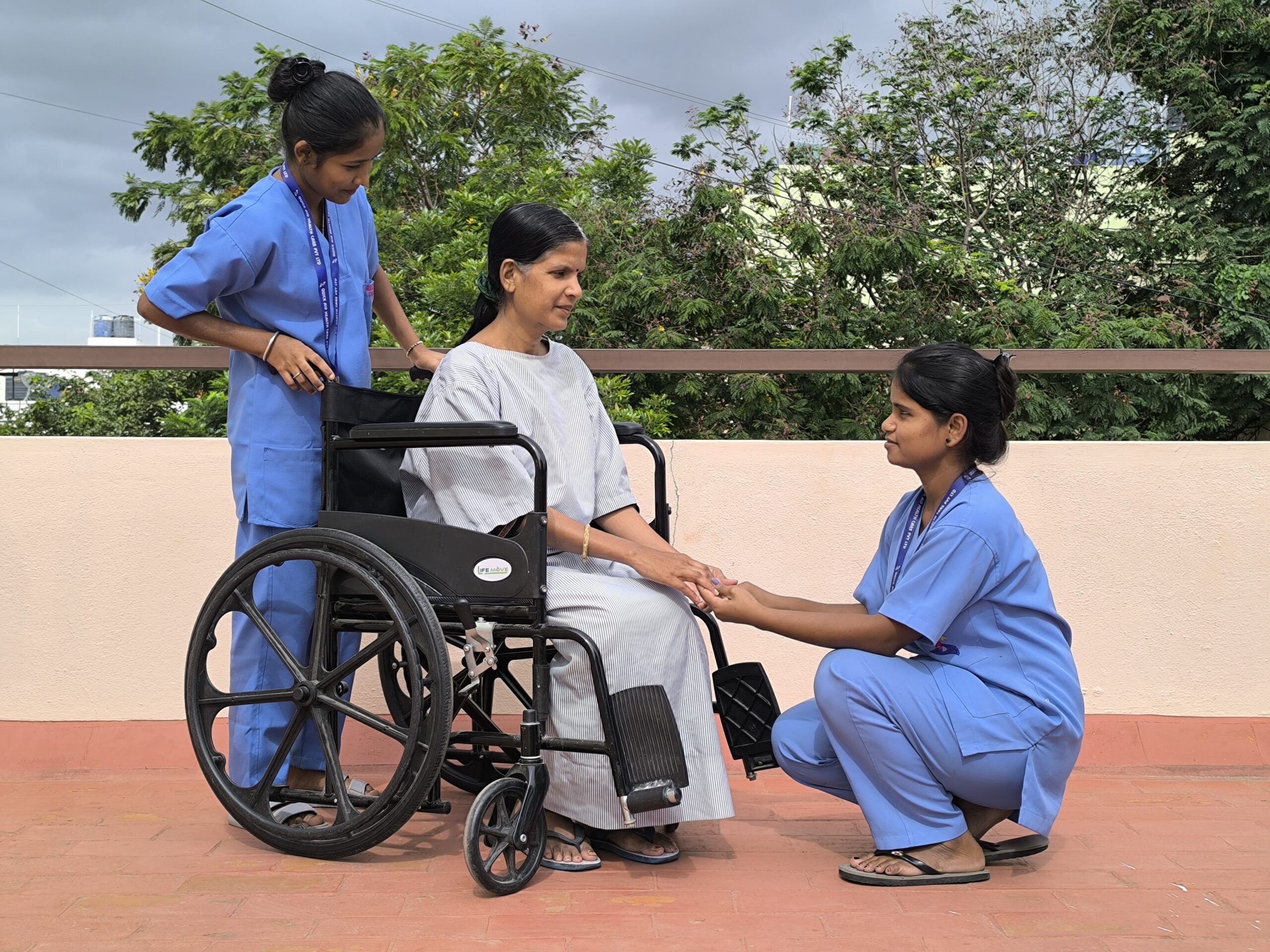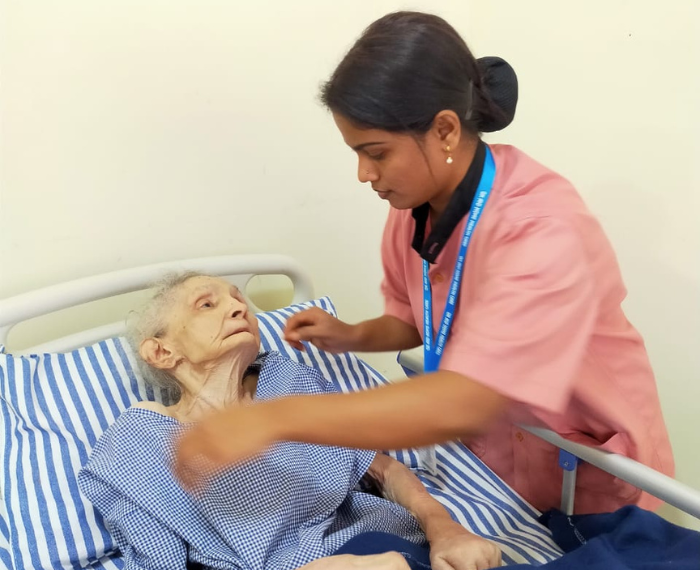Palliative care and hospice service at home
Palliative care is an approach which aims at providing quality of human life in patients who are suffering from chronic diseases. To improve the living conditions of such patients with utmost love, care, and compassion under medical surveillance. It can be cardiovascular, difficulty in breathing, AIDS, Cancer, Diabetes, kidney failure, neurological, Parkinson’s the list goes on when life is threatened not just for the patient, but all the loved ones around them. A team of trained professionals is required to monitor the patients to live better.
Our team offers all the necessary medical support in giving care to our patients. Administering the medications to relieve pain is managed with patience and empathy.
We have received the trust of 98.3% customers delight ratings, and this strengthens our strive to provide the best palliative care experience to our patrons and their families.
Standards of Treatment
Well Communication
Infection Prevention
25+ Years Experience
Palliative care service at home

QuickAid Healthcare offers compassionate palliative care at home, ensuring comfort for patients with serious illnesses. Our dedicated team provides personalized medical, emotional, and spiritual support to enhance the quality of life for both patients and their families.
1. Comfort of Home: Patients receive care in the familiar and comforting environment of their own home, which can significantly enhance their quality of life and overall well-being.
2. Personalized Care: QuickAid Healthcare provides tailored care plans that cater to the specific needs and preferences of each patient, ensuring a higher standard of personalized attention.
3. Family Involvement: Home-based care allows family members to be actively involved in the patient’s care, offering emotional support and ensuring that their loved one receives the best possible care.
4. Specialized Professionals: QuickAid Healthcare employs a team of skilled professionals, including doctors, nurses, and therapists, who specialize in palliative care and are dedicated to managing pain and other symptoms effectively.
5. Reduced Hospital Visits: Receiving palliative care at home reduces the need for frequent hospital visits, which can be physically and emotionally exhausting for patients and their families.
6. Holistic Approach: The care provided by QuickAid Healthcare focuses on the whole person, addressing physical, emotional, spiritual, and social needs to improve the patient’s overall quality of life.
7. Cost-Effective: Home-based palliative care can be more cost-effective compared to prolonged hospital stays, reducing financial strain on families.
8. Flexibility and Convenience: QuickAid Healthcare offers flexible scheduling and on-demand services, ensuring that patients receive timely and convenient care without the hassle of traveling.
9. Emotional and Psychological Support: The team provides not only medical care but also emotional and psychological support, helping patients and their families cope with the challenges of serious illness.
10. Continuity of Care: With QuickAid Healthcare, patients benefit from continuous and consistent care, as the same team of healthcare providers will be involved throughout their care journey, ensuring seamless communication and coordination.
Advantages of Quick Aid Palliative care

Here are the ten advantages of QuickAid Healthcare’s palliative care at home with the specified formatting changes:
1. Flexible Care Schedules: Care schedules can be adjusted to meet the needs of the patient and their family, providing care at times that are most convenient and necessary.
2. Improved Quality of Life: By managing symptoms effectively at home, palliative care can help improve the quality of life for patients by maximizing comfort and reducing pain and discomfort.
3. Professional Support: Access to a team of healthcare professionals including doctors, nurses, and specialists who coordinate to provide comprehensive care.
4. Emotional and Spiritual Support: Palliative care at home also addresses the emotional, social, and spiritual needs of patients, helping them and their families cope with the challenges of a serious illness.
Advantages of Quick Aid Palliative care at home

Services under QuickAid Healthcare’s palliative care at home:
Personalized Treatment Plans: Services are tailored to meet the individual needs and preferences of each patient, ensuring personalized and appropriate care.
Symptom Management: Effective management of pain and other distressing symptoms, improving patient comfort at home.
24/7 Availability: Healthcare providers are often available round the clock to offer assistance and manage any emergencies that may arise.
Interdisciplinary Team: Care is provided by a team comprising various specialists including physicians, nurses, and therapists who work together to address all aspects of patient care.
Family Support: Families receive guidance and support on how to care for their loved ones, including training on basic medical procedures and emotional support.
End-of-Life Care: Specialized support is provided to ensure dignity and comfort for patients approaching end-of-life, including hospice care when needed.
Medication Management: Regular reviews and adjustments of medication to optimize symptom control and minimize side effects.
Psychological Support: Counseling and support services are available for both patients and their families to help deal with the emotional aspects of chronic illness.
Spiritual Care: Depending on the patient’s desires, spiritual care can be provided to help them find peace and fulfillment.
Improved Accessibility: Reduces the need for travel and wait times, providing care directly to patients in their own homes, which is particularly beneficial for those with mobility issues.
End-to-end Funeral Services: Reduces the need for travel and wait times, providing care directly to patients in their own homes, which is particularly beneficial for those with mobility issues.
Our Team

Frequently Asked Questions
Palliative care is specialized medical care for people with serious illnesses. It focuses on providing relief from symptoms, pain, and stress to improve quality of life for both the patient and the family.
Anyone with a serious, chronic, or life-threatening illness can benefit from palliative care, regardless of age or stage of disease. It is not limited to end-of-life situations but is useful at any stage of illness.
Palliative care is available to patients at any stage of a serious illness and can be provided alongside curative treatments. Hospice care, on the other hand, is specifically for those who are nearing the end of life and have stopped curative treatments
Yes, palliative care can be provided in various settings, including hospitals, outpatient clinics, and at home. Home-based palliative care is designed to make patients more comfortable and to support families in managing care.
No, palliative care does not mean giving up on treatment. It is designed to complement and enhance treatment by managing symptoms and improving quality of life. It can be provided along with curative treatments.

